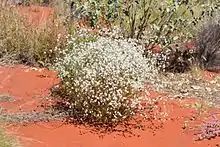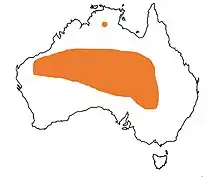Ptilotus latifolius
Ptilotus latifolius, the tangled mulla mulla, is a perennial herb that is native to Australia,[1] which grows abundantly on sand dunes and stony plains. The key diagnostic features of this plant are its very stem bound, shrub like appearance with densely clustered white white flowers with pink tips when newly blossomed. Each stem is generally supported by one to two leaves and the stems have a fluffy textures as well as the flowers. The petiole is generally long in this species and spike bound.[2]
| Ptilotus latifolius | |
|---|---|
 | |
| Scientific classification | |
| Kingdom: | Plantae |
| Clade: | Tracheophytes |
| Clade: | Angiosperms |
| Clade: | Eudicots |
| Order: | Caryophyllales |
| Family: | Amaranthaceae |
| Genus: | Ptilotus |
| Species: | P. latifolius |
| Binomial name | |
| Ptilotus latifolius | |
 | |
| Distribution map for Ptilotus latifolius in Australia | |
Taxonomy
Ptilotus latifolius is a part of the Ptilotus genus which consists of approximately 120 species of annual and perennial herbs and scrubs in the family Amaranthaceae. All species are native to mainland Australia[3] with most of the diversity in this genus occurring in Western Australia in the Pilbara.[4] Common names for the species in this genus include mulla mulla, foxtail, pussy tail and lambs tail. A number of species in the Ptilotus genus are listed as threatened or priority flora in Western Australia.
Reproduction and dispersal
Seeds develop inside enclosed tepals which acts as a seed cases and is distributed by the wind.[5]
References
- "PlantNET - FloraOnline". plantnet.rbgsyd.nsw.gov.au. Retrieved 2022-07-22.
- "Fact sheet for Ptilotus latifolius". www.flora.sa.gov.au. Retrieved 2022-07-22.
- Australia, Atlas of Living. "Species: Ptilotus latifolius (Tangled Mulla Mulla)". bie.ala.org.au. Retrieved 2022-07-22.
- Royal Botanical Gardens (1849). "Ptilotus latifolius". Plants of the World Online.
- Urban, Anne (2001). Wildflowers & plants of inland Australia (1 ed.). Alice Springs: Paul Fitzsimons. ISBN 064641688X.